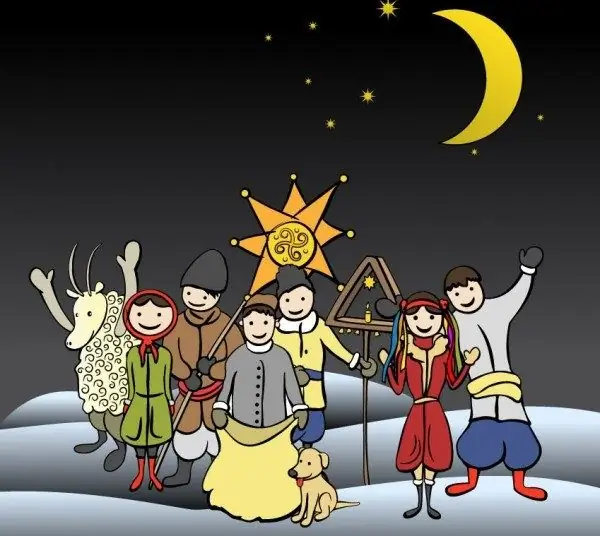- Author Antonio Harrison harrison@cultureoeuvre.com.
- Public 2023-12-16 07:44.
- Last modified 2025-01-22 21:44.
Christmastide, or Holy days, is the period that begins after the Orthodox celebration of the Nativity of Christ (January 7) and lasts until the feast of Epiphany, or Epiphany, which is celebrated by Christians on January 19.

Even before the arrival of Christianity in Russia, Christmastide was celebrated in January by pagans. In honor of the god Svyatovit, or Perun, the Slavs organized wide festivities with an abundance of delicious food, which they hoped to appease the formidable deity. It was believed that during the Christmas period, Perun descends to earth and generously gives those who glorify him.
After the baptism of Rus and the widespread dissemination of the Old and New Testaments, the celebration of Christmastide acquired a new religious character. Saints, or feast days, were from now on dedicated to the great event - the Nativity of Christ. On these days, they prepared a special meal - kutya, lit a fire or lit a candle symbolizing the light of the Star of Bethlehem, and sang the Christmas troparion.
Despite the emergence of new rituals and traditions of the holiday, the old Christmastide foundations were hardly forgotten. From year to year, from century to century during the Christmastide period, the inhabitants of Russia continued, like their grandfathers and great-grandfathers, to observe certain customs and honor signs. So, in order to avoid a terrible heavenly punishment, it was impossible to work, especially spinning. After dinner, it was imperative to leave food leftovers on the table: for deceased relatives, whose souls, according to legend, visited the living at the beginning of January. Food was scattered under the windows, and bonfires were burned at the cemetery gates so that the dead would not get lost.
Fighting against the remnants of paganism, the Orthodox Church during the time of Peter the Great forbade "on the eve of the Nativity of Christ and during the Christmas time to start, according to old idolatrous legends, games and, dressing up in idol robes, to dance along the streets and sing seductive songs." It was about the famous carols, which have survived to this day, and to which today the priests are already more tolerant.
Another serious prohibition of the church was imposed on fortune-telling, so common among young people during the Christmas period. However, this tradition turned out to be tenacious: to this day, from January 7 to January 19 in Russia, girls pour molten wax into water, trying to discern the outlines of their future in it, and in the evenings on the street ask the name of the first man they meet: according to legend, they will wear the same name betrothed.






